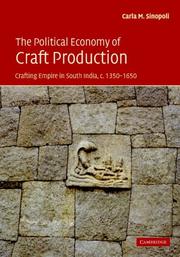| Listing 1 - 3 of 3 |
Sort by
|
Book
ISBN: 9780915703654 0915703653 Year: 2007 Volume: 41 Publisher: Michigan Ann Arbor
Abstract | Keywords | Export | Availability | Bookmark
 Loading...
Loading...Choose an application
- Reference Manager
- EndNote
- RefWorks (Direct export to RefWorks)
Excavations (Archaeology) --- Vijayanagara Metropolitan Survey --- Vijayanagara (Extinct city) --- Vijayanagar (Empire) --- Antiquities --- Archaeological digs --- Archaeological excavations --- Digs (Archaeology) --- Excavation sites (Archaeology) --- Ruins --- Sites, Excavation (Archaeology) --- Archaeology --- Vijayanagara Metropolitan Survey. --- Vijayanagar (Extinct city) --- India --- Vijayanagar, India --- Antiquities. --- Excavations (Archaeology) - India - Vijayanagar (Empire) --- Vijayanagar (Empire) - Antiquities

ISBN: 110713790X 1280431172 0511169787 0511062559 0511205848 0511308582 0511489641 0511071019 9780511062551 9780511071010 9780511489648 9780521826136 0521826136 9781280431173 0521826136 9780521174169 0521174163 Year: 2003 Publisher: Cambridge New York Cambridge University Press
Abstract | Keywords | Export | Availability | Bookmark
 Loading...
Loading...Choose an application
- Reference Manager
- EndNote
- RefWorks (Direct export to RefWorks)
The study of specialized craft production has a long tradition in archaeological research. Through analyses of material remains and the contexts of their production and use, archaeologists can examine the organization of craft production and the economic and political status of craft producers. This study, which was originally published in 2003, combines archaeological and historical evidence from the author's twenty years of fieldwork at the imperial capital of Vijayanagara to explore the role and significance of craft production in the city's political economy of the fourteenth to the seventeenth century. By examining a diverse range of crafts from poetry to pottery, Sinopoli evaluates models of craft production and expands upon theoretical and historical understandings of empires in general and Vijayanagara in particular. It is the most broad-ranging study of craft production in South Asia, or in any other early state empire.
Industries --- Artisans --- Industrial production --- Industry --- Economics --- Artizans --- Craftsmen --- Craftspeople --- Craftspersons --- Skilled labor --- Cottage industries --- History. --- Hampi (India) --- Vijayanagar (Empire) --- Vijayanagar, India --- Hampī, India --- Economic conditions. --- Applied arts. Arts and crafts --- History of Asia --- anno 1300-1399 --- anno 1400-1499 --- anno 1500-1599 --- anno 1600-1699 --- India: South --- Industries, Primitive --- Social Sciences --- Archeology
Book
ISBN: 0520965469 9780520965461 0520291832 9780520291836 Year: 2016 Publisher: Oakland, California University of California Press
Abstract | Keywords | Export | Availability | Bookmark
 Loading...
Loading...Choose an application
- Reference Manager
- EndNote
- RefWorks (Direct export to RefWorks)
"How did the patronage activities of the Vijayanagara Empire (c. 1346-1565) influence Hindu sectarian identities? Contrary to most portraits of the empire as a Hindu bulwark against Islamic incursion from the north or as a religiously ecumenical state, in Polemics and Patronage in the City of Victory, Valerie Stoker argues that the Vijayanagara court was selective in its patronage of religious institutions. But the motivations behind this selectivity were not always religious. To understand the dynamic interaction between religious and royal institutions in this period, she focuses on the career of the Hindu intellectual and monastic leader Vyāsatīrtha. An agent of the state and a powerful religious authority, Vyāsatīrtha played an important role in expanding the empire's economic and social networks. By examining Vyāsatīrtha's polemics against rival sects in the context of his work for the empire, Stoker provides a remarkably nuanced picture of the relationship between religious identity and socio-political reality under Vijayanagara rule"--Provided by publisher.
Hinduism and state --- History --- Vyāsatīrtha, --- Influence. --- Vijayanagar (Empire) --- Religion --- State and Hinduism --- Vyāsarāja, --- Vyāsarāya, --- Vijayanagar, India --- State, The --- Chandrikacharya, --- HISTORY / Asia / India & South Asia. --- 16th century. --- academic. --- ally. --- ancient city. --- city of victory. --- empire. --- government. --- hindu. --- historical. --- india. --- indian government. --- indian history. --- indian politics. --- krishna river. --- military. --- polemics. --- political. --- religion. --- rival. --- rulers. --- scholarly. --- sectarian. --- social life. --- south india. --- translation. --- urban. --- vijayanagara empire. --- world history.
| Listing 1 - 3 of 3 |
Sort by
|

 Search
Search Feedback
Feedback About UniCat
About UniCat  Help
Help News
News